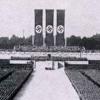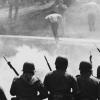When America Fought Fascism: Remembering D-Day 75 Years Later
Street Scribe
It has been 75 years since allied forces fought fascism during the Operation Overlord invasion of Nazi-occupied Europe that has been immortalized in song, story and cinema as D-Day. The June 6, 1944 invasion was the beginning of the end of Adolf Hitler's vaunted "thousand year Reich," which would fall less than a year later. Americans on the home front cheered the heroism of the soldiers, sailors, marines and airmen who took part in the land, sea and air assault that began the liberation of Europe from the shackles of fascist tyranny.
My father, Neal Tant, was one American who took part in the history that was made on D-Day 75 years ago. Serving in the 8th Air Force based in England, my father was a ball turret gunner on a B-17 bomber that was called "Rowdy Rebel" by its mostly Southern crew of 10 men. On June 6, 1944, my father flew his last combat mission over Europe as the battle for the beaches of Normandy raged below. "It was no picnic in that ball turret, but it was a lot better than being on the ground on D-Day," my dad recalled. "We knew that the operation was going to be a part of history, and I'm glad I was able to take part, even if only in a small way, on that day."
By 8th Air Force rules, men like my father had to survive 30 combat missions before they would be taken off the dangerous duty of war in the air. Getting to the magic number 30 was the problem, as was starkly outlined in Catch-22, Joseph Heller's darkly comic novel set during World War II. "The rules said you had to make it through 30 combat missions. If you were sent out on weather reconnaissance missions or decoy flights to divert German forces from our real targets, those didn't count as combat missions, even though they could be dangerous as hell," remembered my father. It was a long and harrowing struggle to live through 30 combat missions, but my father finally achieved that elusive goal in the skies over France on D-Day in 1944.
My dad had received the Air Medal and the Distinguished Flying Cross during his time with the 8th Army Air Force's 447th Bomb Group, but perhaps even more than those honors, he cherished his "Lucky Bastards Club" certificate that he received at a raucous party on the day after he flew his last mission of the war. Done in the style of a diploma and dated June 7, 1944, the Lucky Bastards Club certificate states that it was awarded to Neal Tant, "ball gunner on the Flying Fortress Rowdy Rebel, for having this day achieved the remarkable record of sallying forth and returning no less than thirty times, for having braved the hazards of Hun flak, for bringing to Hitler and his cronies tons of bombs, for bending the Luftwaffe's back; all through the courtesy of the 8th Army Air Force who sponsors these programs in the interest of liberty loving people everywhere."
The Lucky Bastards Club certificates that were given to men like my father used military humor to mitigate some of the horror of the war. "It's scary. It's cold. It's awful," my father said of war. "You're trying to kill other young guys that you'd probably drink a beer with in any other circumstance—and they're trying to kill you."
For all of his life, my father was proud of his role in World War II. He kept up with the postwar lives of his crewmates, and took my mother to England to revisit his old air base near the small town of Rattlesden. By a sweet coincidence, my dad passed away on June 6, 1996—52 years to the day after he flew his last combat mission stuffed into the cramped confines of the ball turret of a B-17 on D-Day.
Young people like my father fought fascism 75 years ago. Now, as those once-young Americans have grown old, fascism is on the march again at home and abroad. White supremacist actions and organizations are on the rise in America and Europe. Authoritarian regimes are entrenched or springing up in countries around the world. An American president seems to long for such authoritarian powers himself as he genuflects to repressive regimes in Russia, Turkey, Hungary and Saudi Arabia. America has a president who praised North Korean dictator Kim Jong-un during a visit to Japan, while at home Americans observed the Memorial Day remembrance of those who fought against authoritarian enemies of freedom.
As Americans remember the heroism of D-Day, let them never forget the warning that author Sinclair Lewis issued in his novel It Can't Happen Here, a chilling tale of America under the iron heel of a homegrown Hitler posing as a populist. The Nobel Prize-winning author's novel was written in 1935—before World War II and D-Day—but it asked a question of this nation that still must be considered today: "Where in all history has there ever been a people so ripe for a dictatorship as ours?"
Keywords
More by Ed Tant
-

Study Shows Pandemics Can Give Rise to Fascism
Street Scribe
-

Six Plague Page-Turners to Read During the Pandemic
Street Scribe
-











comments